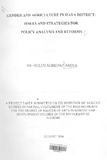| dc.description.abstract | This study describes the significant and critical contribution made by rural women in
Africa to the food security and economies of their countries through their work in the
agricultural sector. The main concern of this study was to analyse and document the
gender division oflabour in agriculture, the male and female differentials in access to and
control of key productive resources, and the specific strategies that can be employed to
develop gender-responsive agricultural policies.
The study is based on qualitative data which was collected through focused group
discussions and in-depth interviews with key informants, heads of households and
respondents selected through purposive sampling. Respondents included female and male
members of farming households in Ramunde sub-location of Siaya District in Nyanza
province of Kenya. Library research was also used to collect data.
Findings confirm the fact that as in many other parts of the world today, in Ramunde sublocation,
there is an increasing trend towards what has been termed the 'feminization of
agriculture'. As men's participation in agriculture declines, the role of women in
agricultural production becomes ever more dominant. Sickness and death from
HIV/AIDS have reduced rural male populations. Another major cause of this
phenomenon is the migration of men from rural areas to towns and cities, in their own " .. countries or abroad, in search of paid employment. -.
Further, data obtained illustrates that despite their contribution to global food security,
women farmers are frequently underestimated and overlooked in development strategies.
A lack of available gender disaggregated data means that women's contribution to
agriculture in particular is poorly understood and their specific needs ignored In
development planning. This is because much of women's work in crop production
consists of unpaid labour in fields that produce for the househo ld rather than the market.
As a result, women's work goes unrecorded in statistics. Because of this scarcity or - in
most cases - sheer lack of available information, there has been little effective recognition
of women's labour in agriculture. Gender-disaggregated data is needed to help
IX
technicians, planners and policy makers identify the role differences in food and cash
crop production as well as men's and women's different managerial and financial control
over the production, storage and marketing of agricultural products. Only by the
collection and analysis of such gender. disaggregated data will development strategies
target women as active and equal partners in agricultural development.
Women's full potential in agriculture must be realized if the goal of the 1996 World Food
Summit - to halve the number of hungry people in the world by 2015 - is to be achieved.
The empowerment of women is key to raising levels of nutrition, improving the
production and distribution of food and agricultural products and enhancing the living
conditions of rural populations.
Therefore, this study recommends that: Legislative, administrative, socio-economic and
attitudinal barriers to rural women's access to the factors of production should be
eliminated through changes in legislation and proactive economic and social policy; the
level of skills and productivity of rural women workers should be raised through public
and private investment in basic education, literacy as well as special skills programmes
and vocational training; Women's organisations should be empowered to enhance their
participation in mainstream policy- and decision-making bodies; and strategies should be
developed to change the mind-sets and operational procedures of rural institutions, both
public and private, to increase their responsivegessto rural women's needs. -.
x | en |

